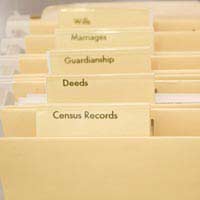Finding 17th and 18th Century Records

We think of the 17th and 18th centuries as being so much closer to our own times in sensibilities than, say, the Tudor period. In terms of records, however, they’re very haphazard and far from modern. Prior to the 1800s there was little centralisation of records, for instance.
Also within that time period is the English Civil War and the Interregnum, where everything was disrupted. It was another factor bringing complications to anyone researching family history.
Electoral Records
Very few people had the right to vote prior to 1832. The Poll Books, published throughout the 18th century, offer lists of who voted, as well as how they voted, which can be useful information if you’re from a wealthy background.Religion
Religion was an important part of life throughout this period. It saw the growth of the Dissenter movement, as well as recusant Catholics. They’re noted, but so are the faithful, approved clergy. They were recorded on the Association Oath Rolls. Those who suffered harsher fates would be fined for not conforming to the Church of England, and their names can be found in the National Archives in the Recusant Rolls.Taxes
One area where close records were kept involved taxes, as this was where the government received its income. The Protestation, which wasn’t exactly a tax, came from the 17th century and is a very complete national document. It can be found in the House of Lords. Returns for the hearth tax as well as other taxes in the period, including the land tax and stamp duties, can all be found in the National Archives. Returns for the window tax will be in county records offices rather than available nationally.Again, most of these will only be useful where your ancestors were above the poverty line. Where they owned luxury items, additional taxes were payable on those, and these are also recorded in the National Archives.
Legal
We tend to think of legal records as only pertaining to criminals. The 17th and 18th centuries were very litigious and many private lawsuits were brought by individuals. Any trial that happened at the Old Bailey is available online from the court’s website. Other Chancery records are available form the National Archives.As there were no church courts during the Commonwealth era, wills had to be proved elsewhere, and this took place at the Prerogative court of Canterbury, with the records available online from the National Archives.
The Commonwealth
The Commonwealth, or Interregnum, was the period between the reigns of Charles I and Charles II. It brought many upheavals in custom and record keeping. They introduced the ideal of civil marriages, instead of church marriages, for instance. The problem was that these marriages weren’t noted in parish registers, or anywhere else, unless vicars did it much later, after the Restoration.Also during this period, supporter of the king had their estates sequestered, and had to petition to have their lands returned (the process was known as “compounding”). They had to provide documentary evidence of several things, including an inventory of the estate, and pay a fine, after which they’d receive one-fifth of the estate. Known as the Composition Papers, where they still exist they give a good picture of contemporary life and wealth.
- Family History: What to Ask Your Older Relations
- Sharing Your Family Tree
- Hidden Clues in Family History
- The Importance of Heraldry
- Tracing Aristocratic Ancestors
- The Importance of Newspapers as a Source
- Tracing Huguenot History in England
- Using Family Photographs to Trace Your Family
- Using Family Stories to Trace Family History
- How To Find And Use The Main Genealogy Sources
- The Importance of the Protestation in Genealogy
- Using Original Sources in Genealogy
- Baptism Records and Tracing Your Ancestors
- Birth Certificates and Genealogy
- Genealogy And Immigrant Ancestors
- Genealogy Information From The Cemetery
- How To Use Census Records In Genealogy
- Searching Education Records
- Tracing Your Family History Using Military Records
- Using Marriage Certificates for Genealogy Research


Re: Using Criminal Records For Family History Research
Trying to find dads past history with arrests just out of interest as hes recently passed away and…
Re: Using Criminal Records For Family History Research
Hi all i wanted to find out about my dad's past and nobody seems to know much about it or what he did.…
Re: Maiden Names in Genealogy
Looking for my fathers mother maiden name
Re: Genealogy and a Criminal Past
I am trying to find out about my father crime in 1992 or 1993 my father as pass away 1998 and I would like to find out why he got…
Re: Using Criminal Records For Family History Research
I am trying to find my biological father's police criminal record as I was abused as a child but have…
Re: Cremation Records and Tracing Your Family History
I am trying to find out where has my friends aunt Adelinda Diaz McMullen was cremated and who was her…
Re: Cremation Records and Tracing Your Family History
CAN SOMEONE PLEASE HELP ME WITH TRYING TO FIND OUT WHERE MY FATHER WAS CREMATED/BURIED IN KENT UK. I…
Re: What If You Have Asian Roots?
Ancestor Edward Albert Wells was born in Trichinopoly on 8 May 1833 to his father George Wells of the 54th Regiment at Foot and…
Re: How to Use Church Marriage Records to Trace Your Ancestors
It is still legal for first cousins to marry.
Re: Cremation Records and Tracing Your Family History
My sister finance was cremation and she stayed up by his bedside at Augusta university for days on out…